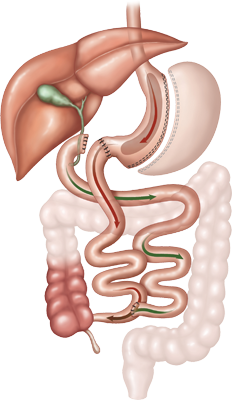
Obesity Surgery Solutions
because life is too short...
Metabolic Surgery
Announcements:
Bariatric Support Group Meeting
 Wednesday, July 15, 5 pm
Wednesday, July 15, 5 pmSharing experiences, recipes, supporting each other
withAndras Sandor, M.D., F.A.C.S.
Where:
ONLINE
REGISTRATION - REQUIRED
Call 781 418-1900
Obesity Surgery Information Seminar
Anytime, at your convenience
The Online Seminar is always open, call our office for a password or install the mobile app

What is metabolic surgery?
Obesity surgery is defined as an operation with a primary goal of weight loss and improvement or remission of comorbid conditions. Metabolic surgery is defined as a procedure with a primary goal to treat diabetes and related medical problems.
 Surgeons in the 1950s already reported that following certain gastric operations a dramatic improvement of diabetes was observed. Today a worldwide epidemic of type 2 diabetes is witnessed. In 2007 246 million people were affected by diabetes worldwide and by 2025 this number will increase to 380 million.
The primary cause of type 2 diabetes is thought to be an autoimmune process that gradually destroys pancreatic beta the cells that are responsible for insulin production. In morbidly obese individuals an increased peripheral insulin resistance is usually also present, which means, that the limited amount of available insulin has even further reduced effect. Insulin is the primary modulator of blood glucose levels. But insulin has many other metabolic effects that are less well understood and it appears that healthy insulin levels are critical for our well-being.
Surgeons in the 1950s already reported that following certain gastric operations a dramatic improvement of diabetes was observed. Today a worldwide epidemic of type 2 diabetes is witnessed. In 2007 246 million people were affected by diabetes worldwide and by 2025 this number will increase to 380 million.
The primary cause of type 2 diabetes is thought to be an autoimmune process that gradually destroys pancreatic beta the cells that are responsible for insulin production. In morbidly obese individuals an increased peripheral insulin resistance is usually also present, which means, that the limited amount of available insulin has even further reduced effect. Insulin is the primary modulator of blood glucose levels. But insulin has many other metabolic effects that are less well understood and it appears that healthy insulin levels are critical for our well-being.
So how do metabolic surgical procedures work?
Metabolic surgical procedures affect diabetes by at least two separate major mechanisms. By inducing weight loss, therefore reducing peripheral insulin resistance and increasing the body's response to the circulating levels of insulin. And more importantly, via the stimulation of the incretin hormones, that are hormones released from the gut. These hormones have a very complex effect on insulin production and glucose metabolism. The beneficial effect on diabetes can be observed on the day following the surgery, before any meaningful weight loss could have occurred.
How powerful are these procedures in treating diabetes?
Various metabolic operations have a varying degree of affect on the remission of type 2 diabetes mellitus. Perhaps the most powerful operation to treat diabetes is the biliopancreatic diversion with duodenal switch. That procedure is not performed in Massachusetts due to concerns about unwanted side effects and very strict vitamin and nutrient regimens, that are difficult to follow.
The Roux-en-Y gastric bypass procedure brings type 2 diabetes into remission in over 80% of patients. The sleeve gastrectomy is less effective in the treatment of type 2 diabetes, somewhere between 60 and 80%, depending on the patient population and the length of follow-up. Studies suggest that patients whose diabetes was diagnosed within the past 5 years and are not using insulin yet would experience the best outcome in terms of complete remission of their disease.
Type 2 diabetes is a progressive disease and involves the destruction of pancreatic B the cells. If all the B cells are destroyed in the pancreas then the surgery is not going to be effective but due to the weight loss effect and the associated metabolic changes, the insulin requirement could still be significantly lower.

Biliopancreatic diversion with duodenal switch
Metabolic surgery is by far the most effective treatment of type 2 diabetes known to medicine. But the surgery should not be delayed for years because of the progressive nature of diabetes.
Can I have metabolic surgery for diabetes if I am not obese?
There is very active research taking place exploring the possibilities of purely metabolic surgeries, that only have a limited effect on weight loss but major influence on diabetes. These operations are performed within the strict control of randomized trials and currently are not covered by insurance companies.
Copyright 2016 Commonwealth Weight Loss, LLC. All Rights Reserved.

